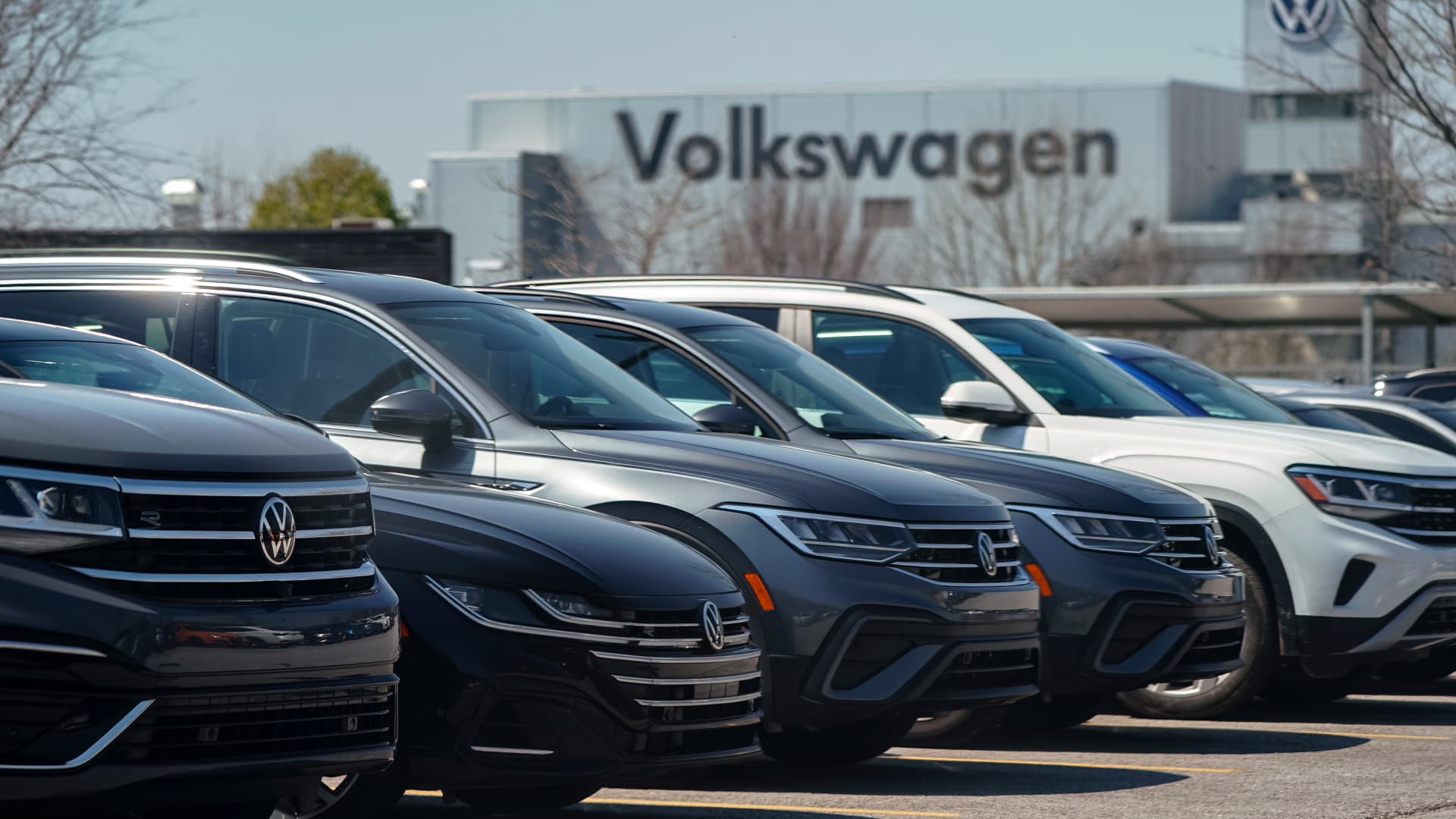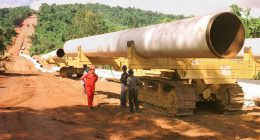
Volkswagens are seen in the employee parking lot at the Volkswagen automobile assembly plant on March 20, 2024 in Chattanooga, Tennessee.
Elijah Nouvelage | Getty Images
DETROIT – The United Auto Workers notched a big win this weekend.
Volkswagen workers in Chattanooga, Tennessee, overwhelmingly voted in favor of joining the UAW – marking the Detroit union’s first victory at a foreign-owned automaker plant in the South. The vote could have wide-ranging impacts on other automakers, organized labor and the overall U.S. automotive industry.
“This is a really profound victory for the UAW and the labor movement in general,” said Alex Hertel-Fernandez, a former U.S. Department of Labor official and associate professor at Columbia University. “It’s also a really decisive victory.”
Union organizing passed with 73% of the vote, or 2,628 workers, in support for the UAW, according to the National Labor Relations Board, which oversaw voting from Wednesday to Friday.
The German automaker and union, barring any challenges to voting, are expected to move forward with bargaining over a contract for roughly 4,300 workers covered under the vote. The NLRB still needs to certify the results.
Here’s what investors should know about the vote and next steps for the UAW:
UAW momentum
The UAW saw last week’s vote as the union’s best shot at organizing the VW plant following strikes and record contracts with General Motors, Ford Motor and Chrysler parent Stellantis in 2023.
The union, led by President Shawn Fain, is using the deals with the Detroit automakers, which included record wage increases and benefits, as springboards for an unprecedented organizing drive of 13 non-union automakers in the U.S.
Other than Volkswagen, the union is targeting: BMW, Honda, Hyundai, Lucid, Mazda, Mercedes-Benz, Nissan, Rivian, Subaru, Tesla, Toyota and Volvo. The drive covers nearly 150,000 U.S. autoworkers, according to the UAW.
“This is likely to be contagious,” said Hertel-Fernandez. “Where workers see successes in organizing or strikes, it tends to inspire further action in that industry and beyond it.”
Kelcey Smith displays UAW buttons in Chattanooga, Tennessee on April 10, 2024.
Kevin Wurm | The Washington Post | Getty Images
Next up for the union are 5,200 Mercedes-Benz workers at an SUV plant in Vance, Alabama. Workers at the facility earlier this month filed NLRB paperwork for a formal election that is scheduled for May 13 through May 17.
“We’re going to carry this fight on to Mercedes and everywhere else,” Fain told VW workers Friday night following the historic vote. “So, thank you all, thank you all for your fight, for your work. And let’s get to it. Let’s go to work. And let’s win more for the working class all over this nation.”
Impact on labor costs
Top of the list of likely impacts from organizing efforts at VW is labor costs.
UAW organizers used the record contracts with the Detroit automakers to gain support for the union in Chattanooga. UBS said in an investor note that VW has a relatively low operating margin in the U.S., and “substantial pay increases could undermine the profitability outlook of the local US operations.”
But for the Big Three Detroit automakers — and their shareholders — the VW organizing drive could be a positive.
GM, Ford and Stellantis have higher all-in labor costs than non-organized automakers such as VW. Depending on contract details, labor pushes as VW and others could even that playing field somewhat.
United Auto Workers President Shawn Fain cheers the U.S. President Joe Biden during the State of the Union address to a joint session of Congress in the House Chamber of the U.S. Capitol in Washington, U.S., March 7, 2024.
Evelyn Hockstein | Reuters
“Overall, given the substantial pay gap between UAW-unionized workers (Detroit-3) and non-unionized workers in the southern states, it can be assumed that the vote will lead to more upwards pressure on wages for VW over time,” UBS said in an investor note.
Prior to last year’s contacts with the Detroit automakers, the all-in labor costs for Ford, GM and Stellantis were between $63 and $67 an hour, according to industry experts. That compared to workers at non-domestic, or transplant, automakers such as VW at $55 an hour. Those costs included all benefits and health care costs.
Still, there’s no guarantee that VW – a much smaller automaker in the U.S. – will agree to the same terms as the traditional domestic automakers.
Fain on Friday said “the real fight begins now,” referring to the expected negotiations between the union and VW.
Union jobs
The VW vote was widely expected to be the easiest in the UAW’s organizing plans, as the union had already established a presence there following votes that narrowly failed in 2019 and 2014.
The margin of success in Chattanooga could bode well for UAW efforts at other automakers, according to Sharon Block, a professor at Harvard Law School and former DOL and NLRB official.
“I think it’s really hard to overestimate the importance of this moment and to overestimate just how strategic the UAW has been in this campaign, which I think suggests that this is not the last time that we’re going to be talking about a UAW victory in an auto plant in the South,” Block said.
Though opposition during the VW vote was sparse, the most notable instance came a day before the election began, in the form of a letter from six Republican governors condemning the UAW’s push to organize automotive factories in the South and warning of potential layoffs.
“We have worked tirelessly on behalf of our constituents to bring good-paying jobs to our states. These jobs have become part of the fabric of the automotive manufacturing industry. Unionization would certainly put our states’ jobs in jeopardy — in fact, in this year already, all of the UAW automakers have announced layoffs,” read the statement, which was signed by governors in Alabama, Georgia, Mississippi, South Carolina, Tennessee and Texas.
Block called the letter an “empty threat” and “cynical ploy,” however noted that increased labor costs can result in fewer jobs.
Fewer jobs in the U.S. automotive industry also means fewer eligible workers for union membership.
Membership with the UAW at the Detroit automakers has significantly fallen in recent decades, as free trade agreements allowed automakers to produce vehicles for cheaper elsewhere.
UAW membership, largely made up of autoworkers but also including workers in agriculture and aerospace, peaked at 1.5 million in 1979. As of last year, the union’s membership was 370,239 workers – down 3.3% from 2022 and 75% from its peak. Workers from the Detroit automakers only made up roughly 150,000 of that 2023 total.
– CNBC’s Michael Bloom contributed to this report.
Read More: World News | Entertainment News | Celeb News
CNBC










